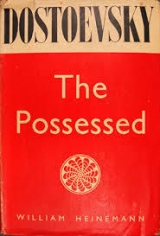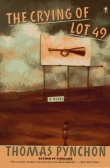
Текст книги "The Possessed"
Автор книги: Федор Достоевский
сообщить о нарушении
Текущая страница: 12 (всего у книги 49 страниц)
The Possessed, by Fyodor Dostoyevsky
Chapter V. The Subtle Serpent
VARVARA PETROVNA rang the bell and threw herself into an easy chair by the window.
“Sit here, my dear.” She motioned Marya Timofyevna to a seat in the middle of the room, by a large round table. “Stepan Trofimovitch, what is the meaning of this? See, see, look at this woman, what is the meaning of it?”
“I ... I ...” faltered Stepan Trofimovitch.
But a footman came in.
“A cup of coffee at once, we must have it as quickly as possible! Keep the horses!”
“ Mais, chere et excellente amie, dans quelle inquietude . ..” Stepan Trofimovitch exclaimed in a dying voice.
“Ach! French! French! I can see at once that it's the highest society,” cried Marya Timofyevna, clapping her hands, ecstatically preparing herself to listen to a conversation in French. Varvara Petrovna stared at her almost in dismay.
We all sat in silence, waiting to see how it would end. Shatov did not lift up his head, and Stepan Trofimovitch was overwhelmed with confusion as though it were all his fault; the perspiration stood out on his temples. I glanced at Liza (she was sitting in the corner almost beside Shatov). Her eyes darted keenly from Varvara Petrovna to the cripple and back again; her lips were drawn into a smile, but not a pleasant one. Varvara Petrovna saw that smile. Meanwhile Marya Timofyevna was absolutely transported. With evident enjoyment and without a trace of embarrassment she stared at Varvara Petrovna's beautiful drawing-room – the furniture, the carpets, the pictures on the walls, the old-fashioned painted ceiling, the great bronze crucifix in the corner, the china lamp, the albums, the objects on the table.
“And you're here, too, Shatushka!” she cried suddenly. “Only fancy, I saw you a long time ago, but I thought it couldn't be you! How could you come here!” And she laughed gaily.
“You know this woman?” said Varvara Petrovna, turning to him at once.
“I know her,” muttered Shatov. He seemed about to move from his chair, but remained sitting.
“What do you know of her? Make haste, please!”
“Oh, well . . .” he stammered with an incongruous smile. “You see for yourself. ...”
“What do I see? Come now, say something!”
“She lives in the same house as I do . . . with her brother . . . an officer.”
“Well?”
Shatov stammered again.
“It's not worth talking about . . .” he muttered, and relapsed into determined silence. He positively flushed with determination.
“Of course one can expect nothing else from you,” said Varvara Petrovna indignantly. It was clear to her now that they all knew something and, at the same time, that they were all scared, that they were evading her questions, and anxious to keep something from her.
The footman came in and brought her, on a little silver tray, the cup of coffee she had so specially ordered, but at a sign from her moved with it at once towards Marya Timofyevna.
“You were very cold just now, my dear; make haste and drink it and get warm.”
“ Herd.”
Marya Timofyevna took the cup and at once went off into a giggle at having said mercito the footman. But meeting Varvara Petrovna's reproving eyes, she was overcome with shyness and put the cup on the table.
“Auntie, surely you're not angry?” she faltered with a sort of flippant playfulness.
“Wh-a-a-t?” Varvara Petrovna started, and drew herself up in her chair. “I'm not your aunt. What are you thinking of?”
Marya Timofyevna, not expecting such an angry outburst, began trembling all over in little convulsive shudders, as though she were in a fit, and sank back in her chair.
“I ... I ... thought that was the proper way,” she faltered, gazing open-eyed at Varvara Petrovna. “Liza called you that.”
“What Liza?”
“Why, this young lady here,” said Marya Timofyevna, pointing with her finger.
“So she's Liza already?”
“You called her that yourself just now,” said Marya Timofyevna growing a little holder. “And I dreamed of a beauty like that,” she added, laughing, as it were accidentally.
Varvara Petrovna reflected, and grew calmer, she even smiled faintly at Marya Timofyevna's last words; the latter, catching her smile, got up from her chair, and limping, went timidly towards her.
“Take it. I forgot to give it back. Don't be angry with my rudeness.”
She took from her shoulders the black shawl that Varvara Petrovna had wrapped round her.
“Put it on again at once, and you can keep it always. Go and sit down, drink your coffee, and please don't be afraid of me, my dear, don't worry yourself. I am beginning to understand you.”
“ Chere amie . ..” Stepan Trofimovitch ventured again.
“Ach, Stepan Trofimovitch, it's bewildering enough without you. You might at least spare me. . . . Please ring that bell there, near you, to the maid's room.”
A silence followed. Her eyes strayed irritably and suspiciously over all our faces. Agasha, her favourite maid, came in.
“Bring me my check shawl, the one I bought in Geneva. What's Darya Pavlovna doing?”
“She's not very well, madam.”
“Go and ask her to come here. Say that I want her particularly, even if she's not well.”
At that instant there was again, as before, an unusual noise of steps and voices in the next room, and suddenly Praskovya Ivanovna, panting and “distracted,” appeared in the doorway. She was leaning on the arm of Mavriky Nikolaevitch.
“Ach, heavens, I could scarcely drag myself here. Liza, you mad girl, how you treat your mother!” she squeaked, concentrating in that squeak, as weak and irritable people are wont to do, all her accumulated irritability. “Varvara Petrovna, I've come for my daughter!”
Varvara Petrovna looked at her from under her brows, half rose to meet her, and scarcely concealing her vexation brought out: “Good morning, Praskovya Ivanovna, please be seated, knew you would come!”
II
There could be nothing surprising to Praskovya Ivanovna in such a reception. Varvara Petrovna had from childhood upwards treated her old school friend tyrannically, and under a show of friendship almost contemptuously. And this was an exceptional occasion too. During the last few days there had almost been a complete rupture between the two households, as I have mentioned incidentally already. The reason of this rupture was still a mystery to Varvara Petrovna, which made it all the more offensive; but the chief cause of offence was that Praskovya Ivanovna had succeeded in taking up an extraordinarily supercilious attitude towards Varvara Petrovna. Varvara Petrovna was wounded of course, and meanwhile some strange rumours had reached her which also irritated her extremely, especially by their vagueness. Varvara Petrovna was of a direct and proudly frank character, somewhat slap-dash in her methods, indeed, if the expression is permissible. There was nothing she detested so much as secret and mysterious insinuations, she always preferred war in the open. Anyway, the two ladies had not met for five days. The last visit had been paid by Varvara Petrovna, who had come back from “that Drozdov woman” offended and perplexed. I can say with certainty that Praskovya Ivanovna had come on this occasion with the naive conviction that Varvara Petrovna would, for some reason, be sure to stand in awe of her. This was evident from the very expression of her face. Evidently too, Varvara Petrovna was always possessed by a demon of haughty pride whenever she had the least ground for suspecting that she was for some reason supposed to be humiliated. Like many weak people, who for a long time 'allow themselves to be insulted without resenting it, Praskovya Ivanovna showed an extraordinary violence in her attack at the first favourable opportunity. It is true that she was not well, and always became more irritable in illness. I must add finally, that our presence in the drawing-room could hardly be much check to the two ladies who had been friends from childhood, if a quarrel had broken out between them. We were looked upon as friends of the family, and almost as their subjects. I made that reflection with some alarm at the time. Stepan Trofimovitch, who had not sat down since the entrance of Varvara Petrovna, sank helplessly into an arm-chair on hearing Praskovya Ivanovna's squeal, and tried to catch my eye with a look of despair. Shatov turned sharply in his chair, and growled something to himself. I believe he meant to get up and go away. Liza rose from her chair but sank back again at once without even paying befitting attention to her mother's squeal – not from “waywardness,” but obviously because she was entirely absorbed by some” other overwhelming impression. She was looking absent-mindedly into the air, no longer noticing even Marya Timofyevna.
III
“Ach, here!” Praskovya Ivanovna indicated an easy chair near the table and sank heavily into it with the assistance of Mavriky Nikolaevitch. “I wouldn't have sat down in your house, my lady, if it weren't for my legs,” she added in a breaking voice.
Varvara Petrovna raised her head a little, and with an expression of suffering pressed the fingers of her right hand to her right temple, evidently in acute pain (tic douloureux).
“Why so, Praskovya Ivanovna; why wouldn't you sit down in my house? I possessed your late husband's sincere friendship all his life; and you and I used to play with our dolls at school together as girls.”
Praskovya Ivanovna waved her hands.
“I knew that was coming! You always begin about the school when you want to reproach me – that's your way. But to my thinking that's only fine talk. I can't stand the school you're always talking about.”
You've come in rather a bad temper, I'm afraid; how are your legs? Here they're bringing you some coffee, please have some, drink it and don't be cross.”
“Varvara Petrovna, you treat me as though I were a child. I won't have any coffee, so there!”
And she pettishly waved away the footman who was bringing her coffee. (All the others refused coffee too except Mavriky Nikolaevitch and me. Stepan Trofimovitch took it, but put it aside on the table. Though Marya Timofyevna was very eager to have another cup and even put out her hand to take it, on second thoughts she refused it ceremoniously, and was obviously pleased with herself for doing so.)
Varvara Petrovna gave a wry smile.
“I'll tell you what it is, Praskovya Ivanovna, my friend, you must have taken some fancy into your head again, and that's why you've come. You've simply lived on fancies all your life. You flew into a fury at the mere mention of our school; but do you remember how you came and persuaded all the class that a hussar called Shablykin had proposed to you, and how Mme. Lefebure proved on the spot you were lying. Yet you weren't lying, you were simply imagining it all to amuse yourself. Come, tell me, what is it now? What are you fancying now; what is it vexes you?”
“And you fell in love with the priest who used to teach us scripture at school – so much for you, since you've such a spiteful memory. Ha ha ha!”
She laughed viciously and went off into a fit of coughing.
“Ah, you've not forgotten the priest then . . .” said Varvara Petrovna, looking at her vindictively.
Her face turned green. Praskovya Ivanovna suddenly assumed a dignified air.
“I'm in no laughing mood now, madam. Why have you drawn my daughter into your scandals in the face of the whole town? That's what I've come about.'
“My scandals?” Varvara Petrovna drew herself up menacingly.
“Maman, I entreat you too, to restrain yourself,” Lizaveta Nikolaevna brought out suddenly.
“What's that you say?” The maman was on the point of breaking into a squeal again, but catching her daughter's flashing eye, she subsided suddenly.
“How could you talk about scandal, maman?” cried Liza, flushing red. “I came of my own accord with Yulia Mihailovna's permission, because I wanted to learn this unhappy woman's story and to be of use to her.”
“This unhappy woman's story!” Praskovya Ivanovna drawled with a spiteful laugh. “Is it your place to mix yourself up with such 'stories.' Ach, enough of your tyrannising!” She turned furiously to Varvara Petrovna. “I don't know whether it's true or not, they say you keep the whole town in order, but it seems your turn has come at last.”
Varvara Petrovna sat straight as an arrow ready to fly from the bow. For ten seconds she looked sternly and immovably at Praskovya Ivanovna.
“Well, Praskovya, you must thank God that all here present are our friends,” she said at last with ominous composure. “You've said a great deal better unsaid.”
“But I'm not so much afraid of what the world will say, my lady, as some people. It's you who, under a show of pride, are trembling at what people will say. And as for all here being your friends, it's better for you than if strangers had been listening.”
“Have you grown wiser during this last week?”
“It's not that I've grown wiser, but simply that the truth has come out this week.”
“What truth has come out this week? Listen, Praskovya Ivanovna, don't irritate me. Explain to me this minute, I beg you as a favour, what truth has come out and what do you mean by that?”
“Why there it is, sitting before you!” and Praskovya Ivanovna suddenly pointed at Marya Timofyevna with that desperate determination which takes no heed of consequences, if only it can make an impression at the moment. Marya Timofyevna, who had watched her all the time with light-hearted curiosity, laughed exultingly at the sight of the wrathful guest's finger pointed impetuously at her, and wriggled gleefully in her easy chair.
“God Almighty have mercy on us, they've all gone crazy!” exclaimed Varvara Petrovna, and turning pale she sank back in her chair.
She turned so pale that it caused some commotion. Stepan Trofimovitch was the first to rush up to her. I drew near also; even Liza got up from her seat, though she did not come forward. But the most alarmed of all was Praskovya Ivanovna herself; She uttered a scream, got up as far as she could and almost wailed in a lachrymose voice:
“Varvara Petrovna, dear, forgive me for my wicked foolishness! Give her some water, somebody.”
“Don't whimper, please, Praskovya Ivanovna, and leave me alone, gentlemen, please, I don't want any water!” Varvara Petrovna pronounced in a firm though low voice, with blanched lips.
“Varvara Petrovna, my dear,” Praskovya Ivanovna went on, a little reassured, “though I am to blame for my reckless words, what's upset me more than anything are these anonymous letters that some low creatures keep bombarding me with; they might write to you, since it concerns you, but I've a daughter!”
Varvara Petrovna looked at her in silence, with wide-open eyes, listening with wonder. At that moment a side-door in the corner opened noiselessly, and Darya Pavlovna made her appearance. She stood still and looked round. She was struck by our perturbation. Probably she did not at first distinguish Marya Timofyevna, of whose presence she had not been informed. Stepan Trofimovitch was the first to notice her; he made a rapid movement, turned red, and for some reason proclaimed in a loud voice: “Darya Pavlovna!” so that all eyes turned on the new-comer.
“Oh, is this your Darya Pavlovna!” cried Marya Timofyevna. “Well, Shatushka, your sister's not like you. How can my fellow call such a charmer the serf-wench Dasha?”
Meanwhile Darya Pavlovna had gone up to Varvara Petrovna, but struck by Marya Timofyevna's exclamation she turned quickly and stopped just before her chair, looking at the imbecile with a long fixed gaze.
“Sit down, Dasha,” Varvara Petrovna brought out with terrifying composure. “Nearer, that's right. You can see this woman, sitting down. Do you know her?”
“I have never seen her,” Dasha answered quietly, and after a pause she added at once:
“She must be the invalid sister of Captain Lebyadkin.”
“And it's the first time I've set eyes on you, my love, though I've been interested and wanted to know you a long time, for I see how well-bred you are in every movement you make,” Marya Timofyevna cried enthusiastically. “And though my footman swears at you, can such a well-educated charming person as you really have stolen money from him? For you are sweet, sweet, sweet, I tell you that from myself!” she concluded, enthusiastically waving her hand.
“Can you make anything of it?” Varvara Petrovna asked with proud dignity.
“I understand it. . . .”
“Have you heard about the money?”
“No doubt it's the money that I undertook at Nikolay Vsyevolodovitch's request to hand over to her brother, Captain Lebyadkin.”
A silence followed.
“Did Nikolay Vsyevolodovitch himself ask you to do so?”
“He was very anxious to send that money, three hundred roubles, to Mr. Lebyadkin. And as he didn't know his address, but only knew that he was to be in our town, he charged me to give it to Mr. Lebyadkin if he came.”
“What is the money . . . lost? What was thiswoman speaking about just now?”
“That I don't know. I've heard before that Mr. Lebyadkin says I didn't give him all the money, but I don't understand his words. There were three hundred roubles and I sent him three hundred roubles.”
Darya Pavlovna had almost completely regained her composure. And it was difficult, I may mention, as a rule, to astonish the girl or ruffle her calm for long – whatever she might be feeling. She brought out all her answers now without haste, replied immediately to every question with accuracy, quietly, smoothly, and without a trace of the sudden emotion she had shown at first, or the slightest embarrassment which might have suggested a consciousness of guilt. Varvara Petrovna's eyes were fastened upon her all the time she was speaking. Varvara Petrovna thought for a minute:
“If,” she pronounced at last firmly, evidently addressing all present, though she only looked at Dasha, “if Nikolay Vsyevolodovitch did not appeal even to me but asked you to do this for him, he must have had his reasons for doing so. I don't consider I have any right to inquire into them, if they are kept secret from me. But the very fact of your having taken part in the matter reassures me on that score, be sure of that, Darya, in any case. But you see, my dear, you may, through ignorance of the world, have quite innocently done something imprudent; and you did so when you undertook to have dealings with a low character. The rumours spread by this rascal show what a mistake you made. But I will find out about him, and as it is my task to protect you, I shall know how to defend you. But now all this must be put a stop to.”
“The best thing to do,” said Marya Timofyevna, popping up from her chair, “is to send him to the footmen's room when he comes. Let him sit on the benches there and play cards with them while we sit here and drink coffee. We might send him a cup of coffee too, but I have a great contempt for him.”
And she wagged her head expressively.
“We must put a stop to this,” Varvara Petrovna repeated, listening attentively to Marya Timofyevna. “Ring, Stepan Trofimovitch, I beg you.”
Stepan Trofimovitch rang, and suddenly stepped forward, all excitement.
“If . . . if . . .” he faltered feverishly, flushing, breaking off and stuttering, “if I too have heard the most revolting story, or rather slander, it was with utter indignation . . . enfin c'est un homme perdu, et quelque chose comme un format evade. . . .”
He broke down and could not go on. Varvara Petrovna, screwing up her eyes, looked him up and down.
The ceremonious butler Alexey Yegorytch came in.
“The carriage,” Varvara Petrovna ordered. “And you, Alexey Yegorytch, get ready to escort Miss Lebyadkin home; she will give you the address herself.”
“Mr. Lebyadkin has been waiting for her for some time downstairs, and has been begging me to announce him.”
“That's impossible, Varvara Petrovna!” and Mavriky Nikolaevitch, who had sat all the time in unbroken silence, suddenly came forward in alarm. “If I may speak, he is not a man who can be admitted into society. He ... he ... he's an impossible person, Varvara Petrovna!”
“Wait a moment,” said Varvara Petrovna to Alexey Yegorytch, and he disappeared at once.
“ C'est un homme malhonnete et je crois meme que c'est un format evade ou quelque chose dans ce genre,” Stepan Trofimovitch muttered again, and again he flushed red and broke off.
“Liza, it's time we were going,” announced Praskovya Ivanovna disdainfully, getting up from her seat. She seemed sorry that in her alarm she had called herself a fool. While Darya Pavlovna was speaking, she listened, pressing her lips superciliously. But what struck me most was the expression of Lizaveta Nikolaevna from the moment Darya Pavlovna had come in. There was a gleam of hatred and hardly disguised contempt in her eyes.
“Wait one minute, Praskovya Ivanovna, I beg you.” Varvara Petrovna detained her, still with the same exaggerated composure. “Kindly sit down. I intend to speak out, and your legs are bad. That's right, thank you. I lost my temper just now and uttered some impatient words. Be so good as to forgive me. I behaved foolishly and I'm the first to regret it, because I like fairness in everything. Losing your temper too, of course, you spoke of certain anonymous letters. Every anonymous communication is deserving of contempt, just because it's not signed. If you think differently I'm sorry for you. In any case, if I were in your place, I would not pry into such dirty corners, I would not soil my hands with it. But you have soiled yours. However, since you have begun on the subject yourself, I must tell you that six days ago Itoo received a clownish anonymous letter. In it some rascal informs me that Nikolay Vsyevolodovitch has gone out of his mind, and that I have reason to fear some lame woman, who 'is destined to play a great part in my life.' I remember the expression. Reflecting and being aware that Nikolay Vsyevolodovitch has very numerous enemies, I promptly sent for a man living here, one of his secret enemies, and the most vindictive and contemptible of them, and from my conversation with him I gathered what was the despicable source of the anonymous letter. If you too, my poor Praskovya Ivanovna, have been worried by similar letters on my account, and as you say 'bombarded' with them, I am, of course, the first to regret having been the innocent cause of it. That's all I wanted to tell you by way of explanation. I'm very sorry to see that you are so tired and so upset. Besides, I have quite made up my mind to see that suspicious personage of whom Mavriky Nikolaevitch said just now, a little inappropriately, that it was impossible to receive him. Liza in particular need have nothing to do with it. Come to me, Liza, my dear, let me kiss you again.”
Liza crossed the room and stood in silence before Varvara Petrovna. The latter kissed her, took her hands, and, holding her at arm's-length, looked at her with feeling, then made the sign of the cross over her and kissed her again.
“Well, good-bye, Liza” (there was almost the sound of tears in Varvara Petrovna's voice), “believe that I shall never cease to love you whatever fate has in store for you. God be with you. I have always blessed His holy Will. . . .”
She would have added something more, but restrained herself and broke off. Liza was walking back to her place, still in the same silence, as it were plunged in thought, but she suddenly stopped before her mother.
“I am not going yet, mother. I'll stay a little longer at auntie's,” she brought out in a low voice, but there was a note .of iron determination in those quiet words.
“My goodness! What now?” wailed Praskovya Ivanovna, clasping her hands helplessly. But Liza did not answer, and seemed indeed not to hear her; she sat down in the same corner and fell to gazing into space again as before.
There was a look of pride and triumph in Varvara Petrovna's face.
“Mavriky Nikolaevitch, I have a great favour to ask of you. Be so kind as to go and take a look at that person downstairs, and if there is any possibility of admitting him, bring him up here.”
Mavriky Nikolaevitch bowed and went out. A moment later he brought in Mr. Lebyadkin.
IV
I have said something of this gentleman's outward appearance. He was a tall, curly-haired, thick-set fellow about forty with a purplish, rather bloated and flabby face, with cheeks that quivered at every movement of his head, with little bloodshot eyes that were sometimes rather crafty, with moustaches and sidewhiskers, and with an incipient double chin, fleshy and rather unpleasant-looking. But what was most striking about him was the fact that he appeared now wearing a dress-coat and clean linen.
“There are people on whom clean linen is almost unseemly,” as Liputin had once said when Stepan Trofimovitch reproached him in jest for being untidy. The captain had perfectly new black gloves too, of which he held the right one in his hand, while the left, tightly stretched and unbuttoned, covered part of the huge fleshy fist in which he held a bran-new, glossy round hat, probably worn for the first time that day. It appeared therefore that “the garb of love,” of which he had shouted to Shatov the day before, really did exist. All this, that is, the dress-coat and clean linen, had been procured by Liputin's advice with some mysterious object in view (as I found out later). There was no doubt that his coming now (in a hired carriage) was at the instigation and with the assistance of some one else; it would never have dawned on him, nor could he by himself have succeeded in dressing, getting ready and making up his mind in three-quarters of an hour, even if the scene in the porch of the cathedral had reached his ears at once. He was not drunk, but was in the dull, heavy, dazed condition of a man suddenly awakened after many days of drinking. It seemed as though he would be drunk again if one were to put one's hands on his shoulders and rock him to and fro once or twice. He was hurrying into the drawing-room but stumbled over a rug near the doorway. Marya Timofyevna was helpless with laughter. He looked savagely at her and suddenly took a few rapid steps towards Varvara Petrovna.
“I have come, madam . . .” he blared out like a trumpet-blast.
“Be so good, sir, as to take a seat there, on that chair,” said Varvara Petrovna, drawing herself up. “I shall hear you as well from there, and it will be more convenient for me to look at you from here.”
The captain stopped short, looking blankly before him. He turned, however, and sat down on the seat indicated close to the door. An extreme lack of self-confidence and at the same time insolence, and a sort of incessant irritability, were apparent in the expression of his face. He was horribly scared, that was evident, but his self-conceit was wounded, and it might be surmised that his mortified vanity might on occasion lead him to any effrontery, in spite of his cowardice. He was evidently uneasy at every movement of his clumsy person. We all know that when such gentlemen are brought by some marvellous chance into society, they find their worst ordeal in their own hands, and the impossibility of disposing them becomingly, of which they are conscious at every moment. The captain sat rigid in his chair, with his hat and gloves in his hands and his eyes fixed with a senseless stare on the stern face of Varvara Petrovna. He would have liked, perhaps, to have looked about more freely, but he could not bring himself to do so yet. Marya Timofyevna, apparently thinking his appearance very funny, laughed again, but he did not stir. Varvara Petrovna ruthlessly kept him in this position for a long time, a whole minute, staring at him without mercy.
“In the first place allow me to learn your name from yourself,” Varvara Petrovna pronounced in measured and impressive tones.
“Captain Lebyadkin,” thundered the captain. “I have come, madam . . .” He made a movement again.
“Allow me!” Varvara Petrovna checked him again. “Is this unfortunate person who interests me so much really your sister?”
“My sister, madam, who has escaped from control, for she is in a certain condition. . . .”
He suddenly faltered and turned crimson. “Don't misunderstand me, madam,” he said, terribly confused. “Her own brother's not going to throw mud at her . . . in a certain condition doesn't mean in such a condition ... in the sense of an injured reputation ... in the last stage . . .” he suddenly broke off.
“Sir!” said Varvara Petrovna, raising her head.
“In this condition!” he concluded suddenly, tapping the middle of his forehead with his finger.
A pause followed.
“And has she suffered in this way for long?” asked Varvara Petrovna, with a slight drawl.
“Madam, I have come to thank you for the generosity you showed in the porch, in a Russian, brotherly way.”
“Brotherly? “
“I mean, not brotherly, but simply in the sense that I am my sister's brother; and believe me, madam,” he went on more hurriedly, turning crimson again, “I am not so uneducated as I may appear at first sight in your drawing-room. My sister and I are nothing, madam, compared with the luxury we observe here. Having enemies who slander us, besides. But on the question of reputation Lebyadkin is proud, madam . . . and . . . and . . . and I've come to repay with thanks. . . . Here is money, madam!”
At this point he pulled out a pocket-book, drew out of it a bundle of notes, and began turning them over with trembling fingers in a perfect fury of impatience. It was evident that he was in haste to explain something, and indeed it was quite necessary to do so. But probably feeling himself that his fluster with the money made him look even more foolish, he lost the last traces of self-possession. The money refused to be counted. His fingers fumbled helplessly, and to complete his shame a green note escaped from the pocket-book, and fluttered in zigzags on to the carpet.
“Twenty roubles, madam.” He leapt up suddenly with the roll of notes in his hand, his face perspiring with discomfort. Noticing the note which had dropped on the floor, he was bending down to pick it up, but for some reason overcome by shame, he dismissed it with a wave.








